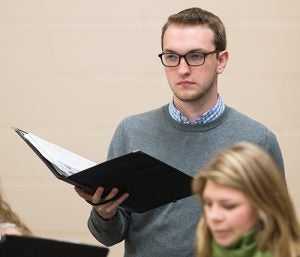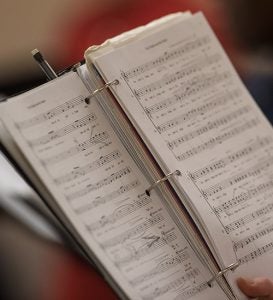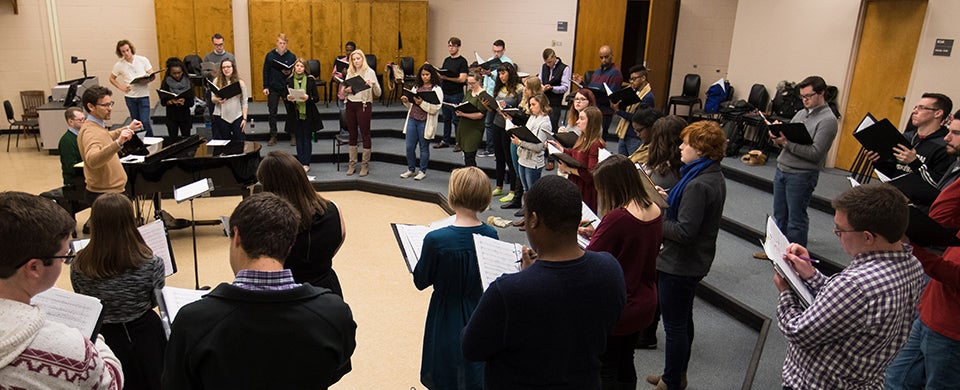PREMIERE PERFORMANCE
ECU student composes music for chancellor's installation
The installation of Dr. Cecil Staton as East Carolina University chancellor on March 24 will feature a world-premiere performance of a composition written for the ceremony by an ECU music student.
Sophomore Christopher Short was chosen in a commissioning competition among ECU student composers to write a piece to be performed by the ECU Chamber Singers at the installation. He adapted the lyrics from a poem by John Masefield, late British poet laureate, chosen by Staton.

Sophomore Christopher Short composed a piece adapted from a poem by John Masefield and selected by ECU’s 11th chancellor, Dr. Cecil Staton. (Photos by Cliff Hollis)
Masefield’s poem was written for the 1946 installation of the chancellor of the University of Sheffield in the aftermath of and as a reaction to the events of World War II, and it celebrates the university as an enduring seat of knowledge, truth and learning. Short’s composition and adapted text from the poem is titled “The Thinker and the Seeker.”
Short is a member of the Chamber Singers as well as a composition student.
“It is always an incredibly rewarding experience to have a group of your peers perform something that you’ve written.” Short said. “Furthermore, it’s an incredibly rewarding experience to be able to work with the conductor-Dr. James Franklin-of the internationally-recognized choir that you sing in. We’ve already started the rehearsal process of the piece and it is a constant reminder that I am truly blessed to go to such a great school with incomparable opportunities.
“Having the world premiere during the installation ceremony of ECU’s new chancellor will make the moment all the more surreal.”
To be considered for the installation commission, ECU student composers submitted musical scores and recordings of two previous works to a panel of judges of School of Music faculty members including professors of composition, voice and choir. Submissions included one work for any combination of instruments, voices, and/or electronics, and one work that included text setting.
The unique idea to feature an original composition by a student at the chancellor installation was initiated by Christopher Ulffers, director of the School of Music, and Dr. Christopher Buddo, dean of the College of Fine Arts and Communication, and implemented in conjunction with ECU Provost Dr. Ron Mitchelson and music faculty.

The ECU Chamber Singers will perform Short’s composition at the upcoming chancellor installation ceremony.
“We wanted to highlight East Carolina University’s excellence in a way specific to Chancellor Staton and his vision, and specific to some of the academic strengths of our university,” Buddo said. “It is appropriate that this important occasion for ECU showcases a student from the School of Music’s exceptional composition program and our award-winning Chamber Singers.”
Aside from the honor of participating in the installation celebration, the commissioning process itself had real-world application for the students involved, according to Dr. Ed Jacobs, ECU composition professor and director of the North Carolina NewMusic Initiative.
“This has exposed our student composers to the commissioning process and gave a talented student composer the opportunity to collaborate with the chancellor’s selected text and the ECU Chamber Singers, a remarkable vocal ensemble,” Jacobs said. “This focus on a student creation and a student premiere performance for this special event emphasizes our educational and creative mission.”
Short agreed that the commission was an exceptional academic exercise for a student composer.
“The commission piece is probably my most advanced choral composition to date,” Short said. “I was able to work one-on-one with Dr. Jacobs, my composition professor, and he really pushed me to the boundaries of my abilities and helped in creating something that I wouldn’t have been able to make had I gotten this opportunity a year ago.”
As the commission winner Short will receive a $2,500 scholarship from the Division of Academic Affairs.

The award-winning Chamber Singers rehearse for the official performance of “The Thinker and the Seeker.”
Complete text
(Italics used in The Think and the Seeker, by Christopher Short)
There are few earthly things more splendid than a university.
In these days of broken frontiers and collapsing values,
when every future looks somewhat grim and the dams are down and
the floods are making misery,
when every ancient foothold has become something of a quagmire,
wherever a university stands, it stands and shines;
wherever it exists, the free minds of men, urged on to full and fair enquiry,
may still bring wisdom into human affairs.
There are few earthly things more beautiful than a university.
It is a place where those who hate ignorance may strive to know
where those who perceive truth may strive to make others see;
where seekers and learners alike,
banded together in the search for knowledge,
will honor thought in all its finer ways,
will welcome thinkers in distress or in exile,
will uphold ever the dignity of thought and learning,
and will exact standards in these things.
They give to the young in their impressionable years,
the bond of a lofty purpose shared,
of a great corporate life whose links will not be loosed until they die.
They give young people that close companionship for which youth longs,
and that chance of the endless discussion of the themes which are endless,
without which youth would seem a waste of time.
There are few things more enduring than a university.
Religions may split into sect or heresy;
dynasties may perish or be supplanted,
but for century after century the university will continue,
and the stream of life will pass through it,
and the thinker and the seeker will be bound together
in the undying cause of bringing thought into the world.
To be a member of these great societies
must ever be a glad distinction.
—By John Masefield (Britain’s Poet Laureate 1930-1967)
Used by permission of The Society of Authors as the Literary Representative of the Estate of John Masefield.